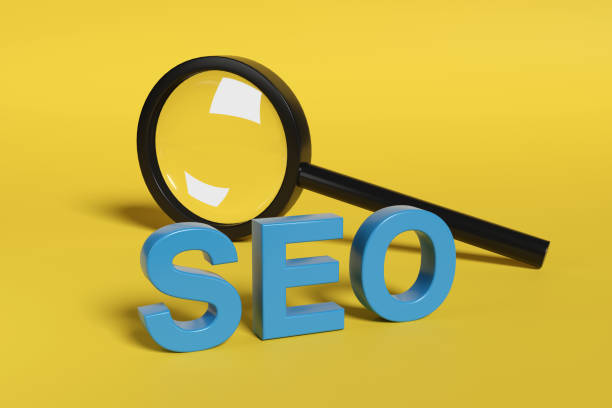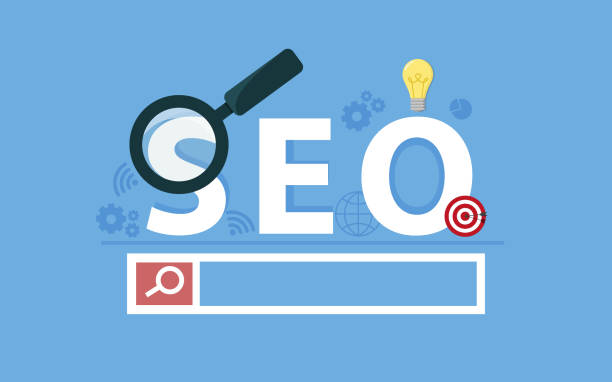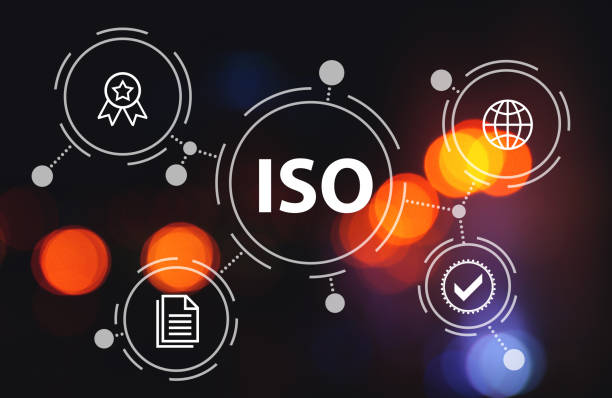Introduction to SEO and its Importance in the Digital World

In the current era, where the internet has become an inseparable part of our daily lives, merely having a website is not enough; its visibility among millions of other sites is of utmost importance.
This is where the #concept_of_SEO and its vital role in the world of #digital_marketing emerge.
SEO, which stands for Search Engine Optimization, or search engine optimization, encompasses a set of techniques and strategies employed to increase a website’s ranking and visibility in the organic (unpaid) results of search engines like Google, Bing, and Yahoo.
The main goal of SEO is to attract organic and targeted traffic to the website; traffic that is obtained through users searching for keywords related to your business or content.
This process is an educational and continuous approach that requires technical knowledge, creativity, and up-to-dateness.
The importance of SEO is undeniable due to the higher click-through rates of organic results compared to paid advertisements, greater user trust in these results, and its long-term sustainability for businesses.
A strong SEO can revolutionize your online presence and lead to increased sales, brand recognition, and website credibility.
A deep understanding of how search engines work and what they expect is the first step on the path to SEO success.
Tired of your e-commerce website not generating as much revenue as it could? Rasaweb, an expert in professional e-commerce website design, solves this problem permanently!
✅ Increased sales and revenue
✅ High loading speed and unparalleled user experience
⚡ Get free e-commerce website design consultation
Types of SEO: From On-Site to Off-Site

To gain a comprehensive understanding of the SEO optimization process, it’s essential to become familiar with its various types.
SEO can be divided into three main categories, each covering different aspects of the website and its surrounding environment: On-Page SEO, Off-Page SEO, and Technical SEO.
On-Page SEO refers to all actions performed within your website and on its content and structure to optimize it for search engines.
This includes optimizing keywords in page titles, meta tags, meta descriptions, headings (H1-H6), text content, images, and internal links.
The goal of this explanatory and practical section is to provide clear and structured information to search engines.
On the other hand, Off-Page SEO refers to activities outside your website that influence its authority and domain strength in the eyes of search engines.
The most important element in Off-Page SEO is link building (backlinks); that is, receiving links from other websites, which indicates the credibility and value of your content.
Activity on social media and branding also fall into this category.
Finally, Technical SEO involves improving the technical aspects of the website to facilitate its crawling and indexing by search engines.
This includes site loading speed, mobile compatibility, URL structure, Robots.txt file, XML sitemap, use of HTTPS protocol, and structured data.
All three types of SEO are essential for achieving high rankings in search results, and a successful SEO campaign requires a balanced combination of all three sections.
Keyword Research: The Foundation of Specialized SEO

Keyword research is the backbone of any successful SEO strategy.
Without a proper understanding of what phrases users employ to find your content or products, all your efforts in SEO optimization will be futile.
This specialized process involves identifying the words and phrases your target audience types into search engines.
The goal of this research is to find keywords that have both a good search volume and less competition, so you can rank well by creating relevant content.
Various tools such as Google Keyword Planner, SEMrush, Ahrefs, and Ubersuggest can assist you in this area.
In addition to search volume and competition, User Intent is also crucial in selecting keywords.
Is the user looking for information (informational keywords), intending to buy (commercial/transactional keywords), or searching for a specific website (navigational keywords)? Answering these questions helps you produce more precise content.
| Keyword Type | Description | Example | User Intent |
|---|---|---|---|
| Short-tail Keywords | General, high search volume, high competition | “shoes” | Vague, needs more information |
| Medium-tail Keywords | More specific, medium search volume, medium competition | “women’s athletic shoes” | Somewhat specific |
| Long-tail Keywords | Very specific, low search volume, low competition, high conversion rate | “best women’s running shoes for winter” | Very specific and targeted |
Focusing on long-tail keywords can provide many opportunities for your website, as although they have lower search volume, they bring higher conversion rates.
Ultimately, keyword research is a dynamic process and should be repeated regularly to always keep pace with changes in trends and user behavior.
This process is key for any successful SEO strategy.
Content Optimization for SEO and User Attraction

After keyword research, the next step is to produce content that is not only optimized for search engines but also engaging and valuable for users.
High-quality and relevant content is the cornerstone of any successful SEO strategy.
Search engines are increasingly emphasizing the quality and depth of content, so simply stuffing text with keywords is no longer effective.
Your content should be thought-provoking content; meaning it should answer users’ questions, address their needs, and provide real value.
To optimize content, first ensure that main and related keywords are naturally placed in the title, introduction, body text, and conclusion.
Use headings (H1, H2, H3) to organize content and improve readability.
This helps search engines better understand the structure and main topic of your page.
Optimize images and videos using alt tags and relevant descriptions, as they not only improve user experience but can also attract traffic from image and video searches.
Content loading speed is also important for user experience and SEO ranking; therefore, compress images and use lightweight code.
Internal linking to relevant pages on your website can also help improve SEO, as it assists search engines in site navigation and distributes page authority across the site.
Finally, your content must be unique, up-to-date, and in-depth to gain the trust of users and search engines and be recognized as a reputable source.
This approach leads to content SEO optimization.
Does your current corporate website present a deserving image of your brand and attract new customers?
If not, turn this challenge into an opportunity with Rasaweb’s professional corporate website design services.
✅ Significantly improves your brand’s credibility and image.
✅ Smoothens the path for attracting leads and new customers for you.
⚡ For free and specialized consultation, contact Rasaweb now!
Technical SEO: Website Infrastructure Optimization

Technical SEO is another fundamental part of an SEO strategy that is often overlooked but plays a vital role in your website’s ranking.
This section deals with improving the technical aspects of a website so that search engines can easily crawl, index, and rank your pages.
A website with a strong technical structure not only offers a better user experience but is also more understandable for search engines.
One of the most important factors in Technical SEO is site speed.
Users and search engines hate slow websites.
By optimizing images, compressing code (HTML, CSS, JavaScript), using caching, and choosing a reliable hosting provider, you can significantly improve your page loading speed.
The second important factor is mobile-friendliness.
Given the significant increase in mobile usage for internet access, Google follows a mobile-first indexing approach.
Therefore, your website must be responsive and display correctly on various devices.
Other important aspects of Technical SEO include using an SSL certificate (HTTPS) for site security, creating an XML sitemap to help search engines discover pages, and a robots.txt file to control crawler access to specific parts of the site.
Additionally, implementing Structured Data can help search engines better understand your content and display it with richer snippets in search results (such as star ratings for products in search results).
These guidelines are vital for any website.
Link Building and Off-Page SEO: Increasing Domain Authority

Link building or backlink creation is one of the most important factors in Off-Page SEO and one of the most complex and time-consuming aspects of SEO.
Backlinks (links from other websites to your website) serve as a vote of confidence from other websites for your content.
The more numerous and higher quality your backlinks are, the more credible and trustworthy search engines consider your website.
This credibility directly impacts your Domain Authority.
Link-building strategies should focus on quality, not merely quantity.
Receiving links from spammy or irrelevant websites can severely damage your rankings.
Some analytical and effective methods for link building include: producing valuable and shareable content (so that others naturally link to it), writing guest posts on reputable and relevant websites, rebuilding broken links (Broken Link Building) by suggesting your similar content, and using social media to promote content and increase visibility.
In addition to backlinks, Social Signals like shares and likes on social media, although not direct ranking factors, can help increase content visibility and, consequently, attract natural backlinks.
Remember that link building should be a natural and gradual process.
Attempts to manipulate search results through artificial link building can lead to severe Google penalties.
A successful Off-Page SEO strategy focuses on building relationships, producing excellent content, and earning natural, high-quality links.
SEO Tools and Performance Analysis: Continuous Monitoring and Optimization

To manage and optimize a successful SEO campaign, using appropriate tools and continuous data analysis is essential.
These tools provide a comprehensive view of your website’s performance in search engines and help you identify your strengths and weaknesses and adjust your strategies based on real data.
The most important and fundamental tools are Google Analytics and Google Search Console, both provided for free by Google.
Google Analytics provides precise information about website traffic, user behavior, bounce rate, traffic sources, and conversions.
Search Console is also a vital tool for monitoring your website’s performance in Google search results, providing information about keywords, links, crawl errors, indexing issues, and mobile compatibility status.
In addition to these free tools, there are powerful paid platforms that offer broader capabilities for SEO reporting, keyword research, competitor analysis, and link building.
The good news is that many of these tools also offer news features and real-time updates.
| Tool Name | Primary Use | Free/Paid |
|---|---|---|
| Google Analytics | Website traffic and user behavior analysis | Free |
| Google Search Console | Monitoring performance in search results, error resolution | Free |
| SEMrush | Keyword research, competitor analysis, link building, site audit | Paid (limited free version) |
| Ahrefs | Backlink analysis, keyword research, competitor analysis, site audit | Paid (limited free version) |
| Ubersuggest | Keyword research, content analysis, idea generation | Paid (limited free version) |
Regular data analysis from these tools allows you to improve your optimization strategy, identify potential problems before they become serious, and take advantage of new opportunities for organic traffic growth.
SEO is a dynamic process, and without precise performance monitoring, you cannot expect sustainable results.
Google Algorithms and Updates: Keeping Pace with Changes

The world of SEO is constantly evolving, and the main reason for these changes is the frequent updates to search engine algorithms, especially Google’s.
Google regularly updates its algorithms to provide users with more accurate and relevant search results and to combat black-hat SEO techniques.
Over the years, we have seen important updates such as Panda, which focused on content quality; Penguin, which combated backlink spam; and Hummingbird, which emphasized understanding the semantic meaning of searches.
Core Updates, which occur every few months, can also bring about significant changes in website rankings.
These updates can provide opportunities for high-quality websites while penalizing or decreasing the rank of websites that do not follow Google’s guidelines.
Therefore, an SEO specialist must always be aware of the latest news and changes in Google’s algorithm.
Studying official Google blogs, following SEO industry news, and analyzing the impact of updates on website traffic and rankings are essential steps.
Google’s goal is always to provide the best user experience, and websites that offer the best content and experience will be winners in the long run.
Adapting to these changes and adhering to fundamental SEO principles not only helps you stay safe from penalties but also provides opportunities for continuous improvement and outpacing competitors.
This part of SEO updates is crucial for any website.
Did you know that 94% of the first impression of a company is related to its website design?
Rasaweb, by offering professional corporate website design services, helps you create the best first impression.
✅ Creates a professional and trustworthy image for your brand
✅ Easier attraction of potential customers and improved online standing
⚡ For free and specialized consultation, contact Rasaweb now!
The Future of SEO and New Trends: AI and Beyond

The world of SEO is rapidly evolving, with new trends emerging daily that require special attention.
Artificial intelligence in SEO and machine learning play an increasing role in how search engines operate.
Algorithms like RankBrain and BERT enable Google to better understand users’ true intent and provide more relevant search results.
This means your content should be optimized not just for keywords, but for the overall meaning and concept the user is searching for.
One of the most important future trends is Voice SEO.
With the increasing use of voice assistants like Siri, Alexa, and Google Assistant, how users search is changing.
Voice searches are typically longer and more conversational, so optimizing for long-tail keywords and natural questions becomes important.
Local SEO will also become more important for physical businesses.
With the rise of “near me” searches and the use of Google Maps, a strong presence in local search results can drive significant traffic to your business.
Core Web Vitals, a set of user experience metrics (such as loading speed, interactivity, and visual stability), have become important ranking factors.
Video content has also become increasingly popular, and video SEO for YouTube and other platforms has gained significant importance.
These trends indicate that SEO is no longer limited to keywords and links but depends on providing a comprehensive and satisfying user experience through diverse content and high speed across various devices.
These engaging aspects of SEO can shape the future.
Common SEO Mistakes and Avoidance Strategies

On the path to SEO optimization, mistakes can occur that not only render your efforts fruitless but can also lead to your website being penalized by search engines.
Recognizing these SEO mistakes and avoiding them is crucial for maintaining your site’s health and ranking.
One of the most common mistakes is keyword stuffing.
This outdated tactic not only ruins the user experience but is also detected and penalized by modern Google algorithms.
Your content should be natural and readable.
Another mistake is duplicate content or low-quality and valueless content (Thin Content).
Google values unique and in-depth content; therefore, avoid copying content from other sites or producing superficial content without added value.
Using black-hat SEO techniques such as artificial link building, cloaking, or hidden content can also lead to severe penalties and even complete removal of the site from search results.
Always follow Google’s Webmaster Guidelines and focus on white-hat SEO.
Ignoring mobile SEO is another big mistake.
Given Google’s mobile-first approach, your website must be fully optimized for mobile.
Also, neglecting site loading speed, ignoring crawl errors, and not using structured data can harm your rankings.
To avoid these issues, regularly audit your website, use SEO tools to identify errors, and always focus on providing the best user experience.
A successful SEO strategy is built on honesty, quality, and continuous effort.
Avoid over-optimization and behave naturally.
Frequently Asked Questions
| Question | Answer |
|---|---|
| What is SEO? | SEO, or Search Engine Optimization, is a process for increasing the quality and quantity of website traffic by improving the site’s ranking in natural (organic) search engine results like Google. |
| What are the main types of SEO? | SEO is divided into three main categories: On-Page SEO, Off-Page SEO, and Technical SEO. |
| What does On-Page SEO include? | On-Page SEO includes optimizing elements within the website, such as keywords, Title Tag, Meta Description, content, URL structure, images, and internal links. |
| What is Off-Page SEO? | Off-Page SEO refers to activities outside the website that help improve its ranking, such as Backlink Building, social media marketing, and Brand Mentions. |
| What is Technical SEO? | Technical SEO deals with optimizing the technical aspects of a website to help it be better crawled and indexed by search engines. This includes site speed, mobile-friendliness, site structure, Sitemaps, and the Robots.txt file. |
| What role do Keywords play in SEO? | Keywords are phrases that users enter into search engines. The correct and targeted use of relevant keywords in content and site elements helps search engines understand the topic of your page and display it for relevant searches. |
| What is a Backlink and why is it important? | A backlink, or inbound link, is a link from one website to another. Backlinks act as a “vote of confidence” from other sites for search engines and play a significant role in site authority and ranking, especially if they are from reputable sites. |
| What impact does quality content have on SEO? | High-quality, relevant, comprehensive, and unique content not only attracts and retains users but also shows search engines that your page is valuable. This helps improve rankings, reduce bounce rate, and increase user time on site. |
| Why is site loading speed important for SEO? | Site loading speed is a crucial ranking factor for Google. Faster sites provide a better user experience, have lower bounce rates, and are preferred by search engines. |
| Is SEO a one-time process? | No, SEO is an ongoing and long-term process. Search engine algorithms are constantly changing, competition is increasing, and website content also needs updating. Therefore, SEO requires continuous monitoring, analysis, and optimization. |
And other advertising services by Rasaweb Advertising Agency
Smart Data Analysis: An innovative platform to improve customer acquisition using real data.
Smart Direct Marketing: An innovative platform to improve customer acquisition by customizing the user experience.
Smart Direct Marketing: A fast and efficient solution for user engagement with a focus on SEO-driven content strategy.
Smart Marketing Automation: A fast and efficient solution for improving SEO ranking with a focus on marketing automation.
Smart Digital Advertising: An effective tool for analyzing customer behavior with the help of real data.
And over hundreds of other services in internet advertising, advertising consultation, and organizational solutions
Internet Advertising | Advertising Strategy | Advertorial
Resources
SEO Training
SEO Tools
Website Optimization Guide
Professional SEO Services
? In today’s highly competitive world, your powerful online presence finds meaning with Rasaweb Afarin. We are by your side to elevate your business to its peak with our expertise in user-friendly website design, SEO, and digital marketing. To start a digital transformation, contact us today.
📍 Tehran, Mirdamad Street, Next to Bank Markazi, Southern Kazeroon Alley, Ramin Alley, No. 6




